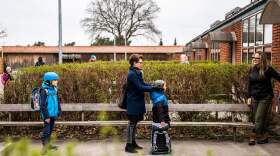
Anya Kamenetz
Anya Kamenetz is an education correspondent at NPR. She joined NPR in 2014, working as part of a new initiative to coordinate on-air and online coverage of learning. Since then the NPR Ed team has won a 2017 Edward R. Murrow Award for Innovation, and a 2015 National Award for Education Reporting for the multimedia national collaboration, the Grad Rates project.
Kamenetz is the author of several books. Her latest is The Art of Screen Time: How Your Family Can Balance Digital Media and Real Life (PublicAffairs, 2018). Her previous books touched on student loans, innovations to address cost, quality, and access in higher education, and issues of assessment and excellence: Generation Debt; DIY U: Edupunks, Edupreneurs, and the Coming Transformation of Higher Education, and The Test.
Kamenetz covered technology, innovation, sustainability, and social entrepreneurship for five years as a staff writer for Fast Company magazine. She's contributed to The New York Times, The Washington Post, New York Magazine and Slate, and appeared in documentaries shown on PBS and CNN.
-
A top pediatrician calls for reopening schools as soon as possible because of the negative impact the shutdown is having on students' learning and mental health.
-
The National Sexual Assault Hotline reports a jump in calls coming in from minors in the month of March, when many shelter-in-place orders began.
-
From shorter days to smaller classes, school will likely look radically different in the fall.
-
Around the country, losses of educators are mounting. It's unknown whether working in schools when they were open might have exposed staff to more danger than an average workplace.
-
Almost nine out of every 10 children enrolled in classes is not going to school because of the coronavirus outbreak. Americans can learn from examples around the world.
-
Nearly 30 million U.S. children count on schools for free or low-cost meals. Most are home now, and school leaders are working hard to make sure they have food to eat.
-
The coronavirus is raising a lot of questions for parents, from how to talk to children about it to weathering school closures to screen time strategies when you're home with little ones.
-
Closing schools can slow the spread of disease and, in turn, save lives. But it also causes huge disruptions, especially for children who depend on the free and reduced-cost meals they get at school.
-
Harvard University, Rice University and Ohio State University are among the schools that have paused in-person classes. More than half a million students are affected by the cancellations.
-
"When we organize, we model the world we want to see," says teenager Xiye Bastida. Activist girls like Bastida have been especially visible in the fight against climate change.









